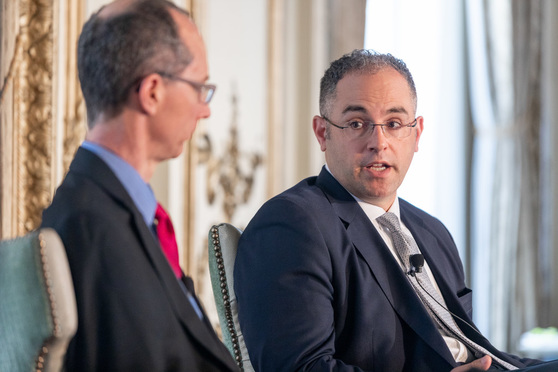SEC Cyber Unit Chief Warns Steeper Penalties May Be Coming for ICO Issuers That Flout Rules
The head of the U.S. Securities and Exchange Commission's cyber unit said participants have been put on notice that more actions and penalties could be in store for violators.
May 10, 2018 at 06:15 PM
3 minute read

SAN FRANCISCO — Robert Cohen, the head of the U.S. Securities and Exchange Commission's cyber unit, warned on Thursday that the agency may seek more severe sanctions against issuers of initial coin offerings if they continue to flout securities regulations.
In a keynote address at the annual Securities Enforcement Forum West event, Cohen said the agency put participants in the ICO space on notice of how securities laws apply through last summer's “DAO Report,” numerous speeches by SEC Chairman Jay Clayton, and the Munchee ICO enforcement action, which did not result in any penalty.
“If the conduct continues, despite all that, I think you will continue to see cases and probably the remedies will go up,” Cohen said.
The senior SEC official said the agency still has “a number of investigations ongoing” over ICOs, not only related to fraud but also “purely registration issues.” Cohen said investigating digital assets has been one of the biggest areas of focus of the cyber unit, which was created in September as part of the SEC enforcement division.
“The ICO cases and digital asset fraud cases are keeping us very busy,” he said.
His remarks come amid a wave of enforcement actions over alleged frauds that sought to rip off retail investors using the hype around bitcoin and blockchain technology, as well as civil litigation alleging that certain digital tokens are actually unregistered securities. Aside from Munchee, the SEC has not yet brought another case purely over a registration violation.
Cohen said the creation of the cyber unit reflects the priority the SEC places on digital assets as well as cybersecurity issues. He noted that the roughly 30-person unit was created with existing SEC staff—not new hiring—and has groups at SEC offices in Washington, New York, Chicago, San Francisco, and Philadelphia.
At a different panel later in the day, Michele Layne, director of the SEC's Los Angeles regional office, also said her office is conducting a number of registration and fraud-based ICO investigations.
Cohen's other remarks at the event focused on the SEC's recent cybersecurity breach disclosure guidance. In his comments, he underscored that the commission does not want to second-guess “reasonable, good-faith disclosures.”
Noting the SEC's recent $35 million settlement with Yahoo over its belated disclosures, Cohen said: “I don't think a reasonable person could argue that that was a close call.”
Cohen also stressed that the SEC is very focused on ensuring companies have a plan for what to do after they get hacked, given that breaches of some kind are increasingly inevitable.
“The nature of the entities and nations that are looking to infiltrate the systems in corporate America are very sophisticated,” Cohen said. “It's often shockingly easy to figure out whether this was a firm that thought about this or not.”
➤➤ Want to read more about how new tech is challenging old laws and changing the legal profession? Sign up for What's Next, a weekly email briefing on the future of law.
This content has been archived. It is available through our partners, LexisNexis® and Bloomberg Law.
To view this content, please continue to their sites.
Not a Lexis Subscriber?
Subscribe Now
Not a Bloomberg Law Subscriber?
Subscribe Now
NOT FOR REPRINT
© 2025 ALM Global, LLC, All Rights Reserved. Request academic re-use from www.copyright.com. All other uses, submit a request to [email protected]. For more information visit Asset & Logo Licensing.
You Might Like
View All
Buchalter Hires Longtime Sheppard Mullin Real Estate Partner as Practice Chair

Reality TV Couple and Pacific Palisades Neighbors Sue City of Los Angeles Over Loss of Homes to Fire
3 minute read
In Resolved Lawsuit, Jim Walden Alleged 'Retaliatory' Silencing by X of His Personal Social Media Account
Trending Stories
- 1No Two Wildfires Alike: Lawyers Take Different Legal Strategies in California
- 2Poop-Themed Dog Toy OK as Parody, but Still Tarnished Jack Daniel’s Brand, Court Says
- 3Meet the New President of NY's Association of Trial Court Jurists
- 4Lawyers' Phones Are Ringing: What Should Employers Do If ICE Raids Their Business?
- 5Freshfields Hires Ex-SEC Corporate Finance Director in Silicon Valley
Who Got The Work
J. Brugh Lower of Gibbons has entered an appearance for industrial equipment supplier Devco Corporation in a pending trademark infringement lawsuit. The suit, accusing the defendant of selling knock-off Graco products, was filed Dec. 18 in New Jersey District Court by Rivkin Radler on behalf of Graco Inc. and Graco Minnesota. The case, assigned to U.S. District Judge Zahid N. Quraishi, is 3:24-cv-11294, Graco Inc. et al v. Devco Corporation.
Who Got The Work
Rebecca Maller-Stein and Kent A. Yalowitz of Arnold & Porter Kaye Scholer have entered their appearances for Hanaco Venture Capital and its executives, Lior Prosor and David Frankel, in a pending securities lawsuit. The action, filed on Dec. 24 in New York Southern District Court by Zell, Aron & Co. on behalf of Goldeneye Advisors, accuses the defendants of negligently and fraudulently managing the plaintiff's $1 million investment. The case, assigned to U.S. District Judge Vernon S. Broderick, is 1:24-cv-09918, Goldeneye Advisors, LLC v. Hanaco Venture Capital, Ltd. et al.
Who Got The Work
Attorneys from A&O Shearman has stepped in as defense counsel for Toronto-Dominion Bank and other defendants in a pending securities class action. The suit, filed Dec. 11 in New York Southern District Court by Bleichmar Fonti & Auld, accuses the defendants of concealing the bank's 'pervasive' deficiencies in regards to its compliance with the Bank Secrecy Act and the quality of its anti-money laundering controls. The case, assigned to U.S. District Judge Arun Subramanian, is 1:24-cv-09445, Gonzalez v. The Toronto-Dominion Bank et al.
Who Got The Work
Crown Castle International, a Pennsylvania company providing shared communications infrastructure, has turned to Luke D. Wolf of Gordon Rees Scully Mansukhani to fend off a pending breach-of-contract lawsuit. The court action, filed Nov. 25 in Michigan Eastern District Court by Hooper Hathaway PC on behalf of The Town Residences LLC, accuses Crown Castle of failing to transfer approximately $30,000 in utility payments from T-Mobile in breach of a roof-top lease and assignment agreement. The case, assigned to U.S. District Judge Susan K. Declercq, is 2:24-cv-13131, The Town Residences LLC v. T-Mobile US, Inc. et al.
Who Got The Work
Wilfred P. Coronato and Daniel M. Schwartz of McCarter & English have stepped in as defense counsel to Electrolux Home Products Inc. in a pending product liability lawsuit. The court action, filed Nov. 26 in New York Eastern District Court by Poulos Lopiccolo PC and Nagel Rice LLP on behalf of David Stern, alleges that the defendant's refrigerators’ drawers and shelving repeatedly break and fall apart within months after purchase. The case, assigned to U.S. District Judge Joan M. Azrack, is 2:24-cv-08204, Stern v. Electrolux Home Products, Inc.
Featured Firms
Law Offices of Gary Martin Hays & Associates, P.C.
(470) 294-1674
Law Offices of Mark E. Salomone
(857) 444-6468
Smith & Hassler
(713) 739-1250







